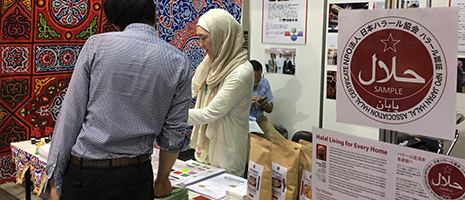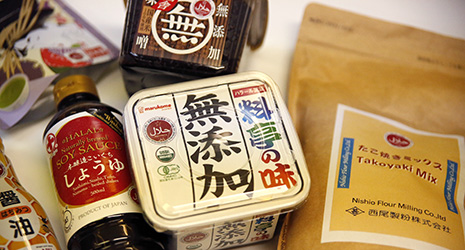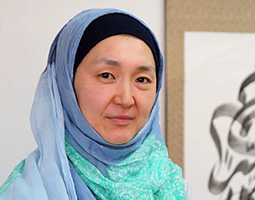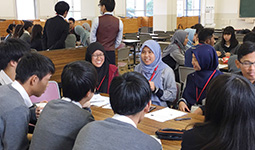Home > Highlighting JAPAN > Highlighting Japan June 2019 > Toward a Multicultural Symbiotic Society
Highlighting JAPAN


The Door to Multicultural Coexistence that Halal Initiatives Open
The number of Muslim travelers visiting Japan is increasing gradually. Welcoming travelers with diverse religious and cultural customs goes beyond hospitality and opens wide the door of multicultural coexistence.
In 2003, the Japanese government formulated the Visit Japan Campaign, aiming to double the number of foreign visitors to Japan, then at about 5,21million, by 2010. Subsequently, a goal of 40million visitors by 2020 and 60million by 2030 was set in 2016. As of the end of 2018, that number had increased to 31,19million. Of those, about 86% were travelers from Asia. Growth is expected especially in visitors from Malaysia and Indonesia, countries with large Muslim populations. There are as many as 1.6 billion Muslims (as of 2010), making up 23% of the world population. Thanks to relaxed visa regulations in 2013 and other measures, the number of visitors from Malaysia and Indonesia has increased from about 65,000 from each country in 2003 to about 470,000 and 400,000, respectively, in 2018. The government aims to create an environment where Muslim visitors can not only worship as normal, but also enjoy Japanese food with peace of mind, as well as expand the number of Muslim visitors, which is why they formulated the Action Plan for Receiving Muslim Visitors to Japan in 2018.
Recently, major airports, railway stations and other public facilities have been equipped with prayer rooms for Muslims having Qibla pointing out the direction for worship. The number of “halal-certified” products has also increased. Halal means that which is legal or allowed according to Islamic law.
Hitomi Remon, chairperson of NPO Japan Halal Association, is one person who has worked to spread this halal certification. She took up employment in Malaysia in her 20s and became a Muslim there. After spending five years in Malaysia, she started a company in Dubai, and returned to Japan after the financial crisis in 2008.
“Muslims are not allowed to ingest pork, non halal meat which is not slaughtered according to Islamic law, or alcoholic drinks. When I first came back to Japan, the supermarkets didn’t sell any meat that I could eat. So I started working with halal certification so that supermarkets can have halal sections where Muslims can find ingredients without the need to worry.”
She gathered supporters who could convey correct information about Islam and halal, and founded NPO Japan Halal Association in 2010 as a nonprofit organization. They invited lecturers from the Jabatan Kemajuan Islam Malaysia (JAKIM), and the association staff studied together about the functions of halal certification bodies that conform to international standards as well as internationally acknowledged halal certification. Halal applies to the method of animal slaughter and to a wide variety of products, including food additives, health foods, and other food products, as well as cosmetics and medical supplies. They have gathered teaching materials about this and currently hold monthly two-day courses for people interested in halal and companies that want to halal-certify their products, alternating between Tokyo and Osaka.
In 2012, the Japan Halal Association was mutually recognized by JAKIM, and Japanese products certified by the association could now be exported to Malaysia. For example, in the case of Japanese traditional condiments like miso and soy sauce, halal certification was difficult due to the small amounts of alcohol produced during the manufacturing process. Remon informed JAKIM about how they are made and what they contain, and export become possible when they agreed that “natural alcohol coming from natural fermentation is not considered impure. Moreover, this is not just about exports, as the number of products with the halal certification mark that Muslim residents and travelers in Japan can safely purchase is increasing as well.
Remon explains that, “In the future, living together with people from other countries will be the norm, so I hope that Japanese children can get interested in Islam too. I want to contribute to the building of a foundation for coexistence with diverse peoples and cultures by the time they grow up. I feel I have responsibility for that.”
The association visits elementary schools, high schools, and universities to tell students about the lifestyle of Muslims, as well as invite adherents of other religions to social events, keeping busy with creating a diverse range of opportunities. The halal-related ideas of Remon and the activities of the association are not just for Muslims, but it goes without saying that they are important also in the sense that they enrich multicultural coexistence in Japan.
© 2009 Cabinet Office, Government of Japan








